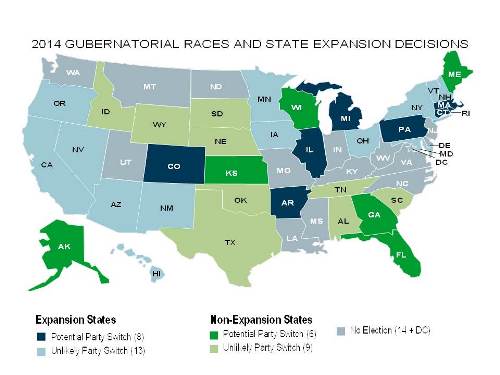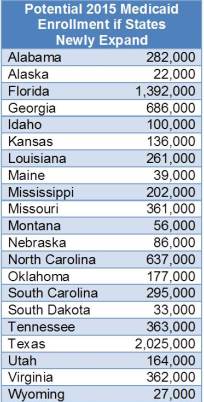Avalere Analysis: 2014 Governors’ Races Could Lead to More Medicaid Expansion
Summary
In at least six states, Medicaid programs could be expanded as a result of the outcome of the 2014 governors' races.Democratic gubernatorial candidates in Florida, Georgia, Kansas, Maine, and Wisconsin, along with an Independent in Alaska, could pursue an expansion if elected. While Republican candidates are reticent to discuss the possibility of Medicaid expansion during a campaign, 10 states with Republican governors have already expanded, and some new Republican governors could support expansion once in office.
The complicating factor for governors is working with state legislatures that may or may not favor Medicaid expansion. For example, new Governor Terry McAuliffe in Virginia supported the expansion, while the legislature ultimately failed to support his plans.
“This is a key election for the future of the Medicaid program,” said Dan Mendelson, CEO at Avalere Health. “Expansion will depend on both the outcomes of the governors’ races as well as state legislative balance, as state legislatures often hold the keys.”

In particular, Republican legislatures in Florida, Georgia, and Kansas could thwart attempts by newly elected governors to expand, while efforts in more narrowly divided legislatures in Maine and Wisconsin will likely face heated debate. Interestingly, Georgia and Kansas both have newly passed laws in place that require legislative approval to expand Medicaid. In Florida, Democratic candidate, Charlie Crist has said he would expand Medicaid through an Executive Order, if elected; however, the legislature previously blocked attempts to expand in 2013 by current Governor Rick Scott.
Several states already expanding Medicaid could also see a shift in gubernatorial control beginning in 2015. Most notably, Arkansas and Pennsylvania – two states expanding Medicaid under alternative expansion plans – could see new parties take control of the governor’s mansion. Arkansas is in the midst of updating its landmark expansion waiver, and Pennsylvania is scheduled to implement an alternative expansion in 2015. While debate over the expansion may be reignited in 2015 based on the outcome of 2014 elections, it appears unlikely that states already expanding will see a drastic change of course in the near term.
“It is incredibly difficult to take benefits away from state residents once they have been granted,” said Caroline Pearson, vice president at Avalere Health, “New governors in states that previously expanded Medicaid may pursue small changes to Medicaid over time that align with their political philosophy, but they are unlikely to fully repeal the expansion.”

Looking ahead, several states, including Tennessee, Utah, and Wyoming continue to seek expansions under current leadership. Avalere’s latest Medicaid expansion map is available here.
For more information about this release, please contact Caroline Pearson at CPearson@Avalere.com
Methodology
:
Election status is based on Real Clear Politics, “2014 Governor Races,” election map accessed on October 29, 2014 at: http://www.realclearpolitics.com/epolls/2014/governor/2014_elections_governor_map.html
Gubernatorial elections categorized as a potential party switch include current toss-up states AK, CO, CT, FL, GA, IL, KS, MA, ME, MI, RI, and WI, and potential pick-up states AR and PA.
Enrollment projections are based on Avalere’s proprietary enrollment model. Avalere assumes the following states opt out of the Affordable Care Act (ACA) Medicaid expansion in 2014 and beyond: AK, AL, FL, GA, ID, KS, LA, ME, MS, MO, MT, NE, NC, OK, SC, SD, TN, TX, UT, VA, WI, and WY. Although Wisconsin has not committed to Medicaid expansion under the ACA, the state is not included in this analysis because it expanded Medicaid eligibility up to 100 percent of the federal poverty level.
Download Avalere’s full release attached.




